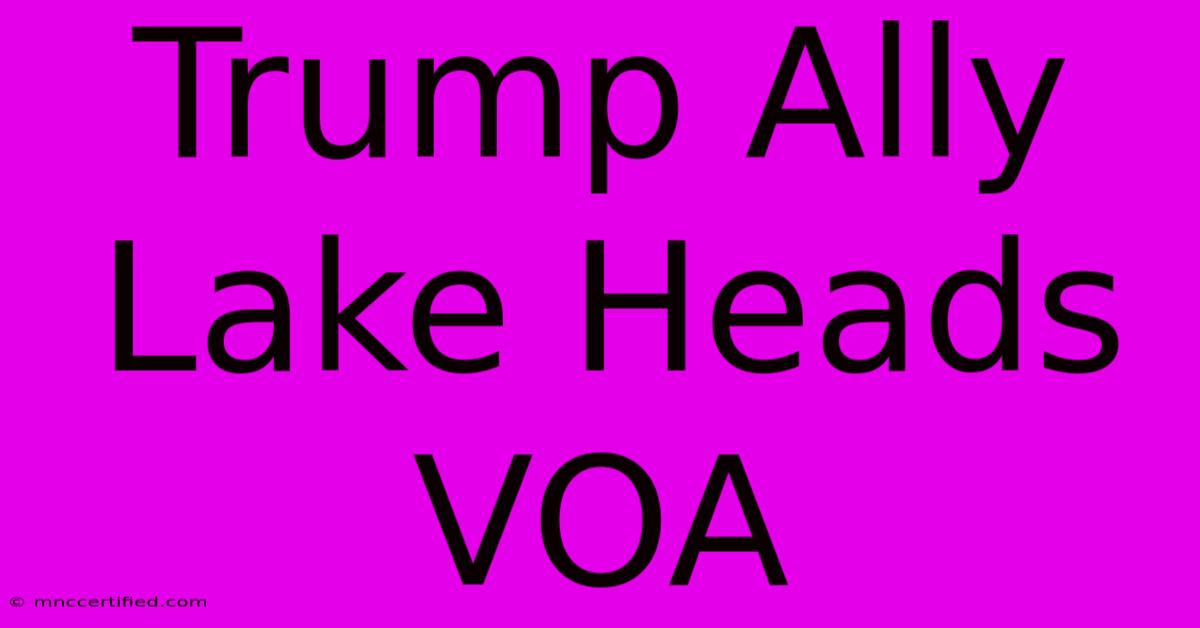Trump Ally Lake Heads VOA

Table of Contents
Trump Ally Lake Heads VOA: A Deep Dive into the Appointment and its Implications
The appointment of Michael Pack, a staunch ally of former President Donald Trump, to lead the U.S. Agency for Global Media (USAGM), which oversees Voice of America (VOA), sparked significant controversy and raised concerns about the future of journalistic independence at the agency. This article will delve into the details of Pack's appointment, analyze its implications for VOA's editorial independence, and explore the broader context of political influence on public media.
Pack's Appointment: A Controversial Choice
Pack's appointment, announced in June 2020, was met with immediate backlash from journalists, media organizations, and Democratic lawmakers. Critics pointed to Pack's history of conservative activism and his outspoken support for Trump as evidence of a potential attempt to politicize VOA and undermine its reputation for objective reporting. His past statements, including criticisms of the media's coverage of Trump, fueled concerns about his commitment to journalistic integrity. The appointment process itself was criticized for a lack of transparency and the bypassing of established procedures.
Concerns Regarding Editorial Independence
One of the primary concerns surrounding Pack's leadership was the potential erosion of VOA's editorial independence. VOA, funded by the U.S. government, has a legal mandate to provide objective news and information to international audiences. Pack's critics feared his influence would lead to biased reporting favoring the Trump administration's agenda, potentially undermining VOA's credibility and its ability to reach its target audiences effectively. The concern extended beyond direct censorship, encompassing the possibility of subtle shifts in editorial direction and the potential chilling effect on journalists hesitant to report critically on the administration.
The Broader Context: Political Influence on Public Media
Pack's appointment wasn't an isolated incident. It occurred within a broader context of increased political pressure on public media organizations globally. Populist and nationalist leaders in various countries have increasingly sought to exert control over state-funded media outlets, using them to promote their narratives and silence dissenting voices. This trend raises serious concerns about the future of independent journalism and the ability of citizens to access unbiased information. The US, often seen as a global defender of press freedom, faced scrutiny for potentially succumbing to this very pressure.
Impact and Aftermath
Pack's tenure at USAGM, while ultimately brief, left a lasting impact. Reports of staff dismissals, internal restructuring, and a perceived shift in editorial priorities fueled existing concerns. While concrete evidence of direct censorship might be difficult to pinpoint, the chilling effect of his appointment was undeniable. The episode highlighted the vulnerability of public media to political manipulation and underscored the importance of robust safeguards to protect journalistic independence.
Long-Term Implications
The long-term implications of Pack's appointment continue to be debated. The episode served as a cautionary tale about the importance of transparency and merit-based appointments in public media. It also raised crucial questions about the appropriate role of government in funding and overseeing media organizations, highlighting the delicate balance between government oversight and editorial independence. The event spurred increased scrutiny of the USAGM and renewed calls for stronger protections against political interference in public broadcasting.
SEO Keywords:
- Michael Pack
- Voice of America (VOA)
- US Agency for Global Media (USAGM)
- Donald Trump
- Editorial Independence
- Journalism
- Political Influence
- Public Media
- Media Bias
- Government Oversight
This article aims to provide a comprehensive overview of the topic, addressing various aspects of the issue and incorporating relevant keywords naturally within the text. It also uses headers, bold text, and a clear structure to improve readability and SEO. Remember to conduct further research and incorporate additional relevant information to ensure the article is up-to-date and comprehensive. Linking to reputable news sources and academic articles will also enhance the credibility and SEO value of your content.

Thank you for visiting our website wich cover about Trump Ally Lake Heads VOA. We hope the information provided has been useful to you. Feel free to contact us if you have any questions or need further assistance. See you next time and dont miss to bookmark.
Featured Posts
-
Glasgows 11 In New Scotland Squad
Dec 13, 2024
-
Singer Max George In Hospital Heart Problem
Dec 13, 2024
-
49ers Rb Guerendo Injury Update And Status
Dec 13, 2024
-
Super League 2024 Top 10 Crowd Numbers
Dec 13, 2024
-
Carlsen Gukesh Impressive But No Match
Dec 13, 2024